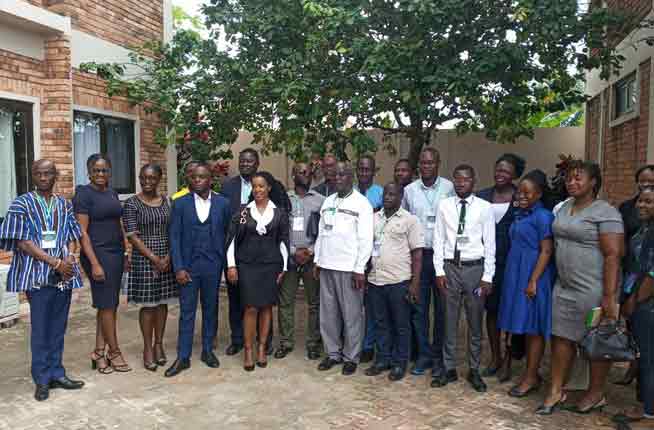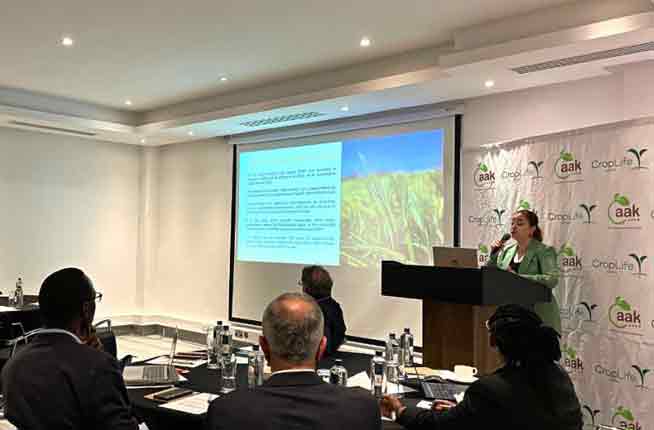The Africa-EU partnership covering agriculture is an opportunity to build a partnership that delivers for both continents, taking into account the varying agronomy and technology needs of both continents due to varying climatic conditions and pest and disease pressures. Impact assessments should guide decision-making and enable the varying
realities to be accounted for in achieving the United Nations’ Sustainable Development Goals in each continent. Access to the necessary technologies plays a key role for livelihoods and improved food security in Africa. Their proper control and responsible use remain a joint public and private sector priority.
CropLife Africa Middle East (the crop protection industry in Africa) is ready to support the implementation of a localized green transition in Africa. This includes on-the-ground farmers training and capacity building, the transition towards a circular economy and national programs for responsible management of waste and tackling the circulation of illegal and or counterfeit inputs and products. The Summit is taking place against a backdrop of farmers in Africa asking for improved market access to the EU and concerns from parties including Governments from many nations worldwide about the EU’s approach to market access and adherence to international agri-food trading standards.
Agriculture is a key industry for Africa. However, it faces a range of evolving challenges. Technologies that support sustainable agricultural practices and development can help
mitigate these. The average African farm currently performs at 40% of its full potential, with the continent being home to more than half of the world’s population facing food insecurity. This makes the use of agricultural innovations even more critical.
As Africa and the European Union renew their partnership and agree a new strategy at the February 2022 EU-Africa Summit, agriculture is expected to be discussed under the heading of a green transition. The EU is working to overcome the challenges of climate change and environmental degradation through its Green Deal. Food and agriculture have a specific Green Deal “Farm to Fork Strategy”, that aims to to make food systems fair, healthy and environmentally-friendly.
The African Union has its agenda 2063, which is a strategic framework that sets its aspiration for “a prosperous Africa based on inclusive growth and sustainable development”. The Comprehensive African Agricultural Development Programme (CAADP), one of the frameworks under Agenda 2063, aims to help African countries eliminate hunger and reduce poverty by raising economic growth through agriculture-led development as well as promoting increased national budget provision to the agriculture sector. While both continents strive to achieve the United Nations’ Sustainable Development Goals, how they achieve this is defined by their varying realities.
Policies suited to the needs of one continent will not necessarily be suited to the other. Africa is more vulnerable to the impact of climate change and its farmers face
pest and disease pressures that European farmers do not. Access to the necessary technologies plays a key role for livelihoods and improved food security
on the continent. Their proper control and responsible use remain a joint public and private sector priority. The Summit is taking place against a backdrop of farmers in Africa asking for improved market access to the EU and concerns from parties including Governments from many nations worldwide about the EU’s approach to market access and adherence to international agri-food trading standards.
CropLife Africa Middle East (CLAME) is an industry association representing seven companies and 22 national associations. We recognise the importance of supporting
farmers across the African continent, Europe and the rest of the world when it comes to the use of crop protection products. It is a fundamental concept that pesticides in use should be safe for people and the environment when used in accordance with the label instructions.
All stakeholders in food production and supply have common priorities: ensuring adequate supply of safe food, protecting the environment and ensuring the wellbeing of people. CropLife member companies are fully committed to the ongoing research, development and introduction of innovative solutions to support the agricultural sector year after year, as challenges such as climate change, pests and disease impacts evolve. Member companies are producing technologies to empower farmers to grow more with less in support of sustainability in food and agriculture. Crop protection products are quite rightly strictly regulated and, prior to being placed on the market, must pass thorough safety and environmental risk assessments. In line with the FAO/WHO International Code of Conduct on Pesticide Management.
CLAME’s aim is to support the Africa EU partnership relating to agriculture in Africa by helping find adapted sustainable solutions. CLAME member companies are adopting and committing to measurable sustainable agricultural practices to mitigate the impact of climate change and ensure sustained food security and food affordability.
CropLife AME members are helping increase yields in Africa and are striving to support Africa’s sustainable development. For maize, a staple crop in Africa, farmers in the EU produce more than 4 times per hectare than farmers in Sub-Saharan Africa. Through improved access to technologies and training on good agronomic practices, CLAME members are helping farmers produce more food more sustainably.
Ensuring that the partnership agreement delivers for both continents will require an evidence-based and science-led discussion and assessment of data from both continents. CLAME members stand ready to support partnerships in agriculture.





